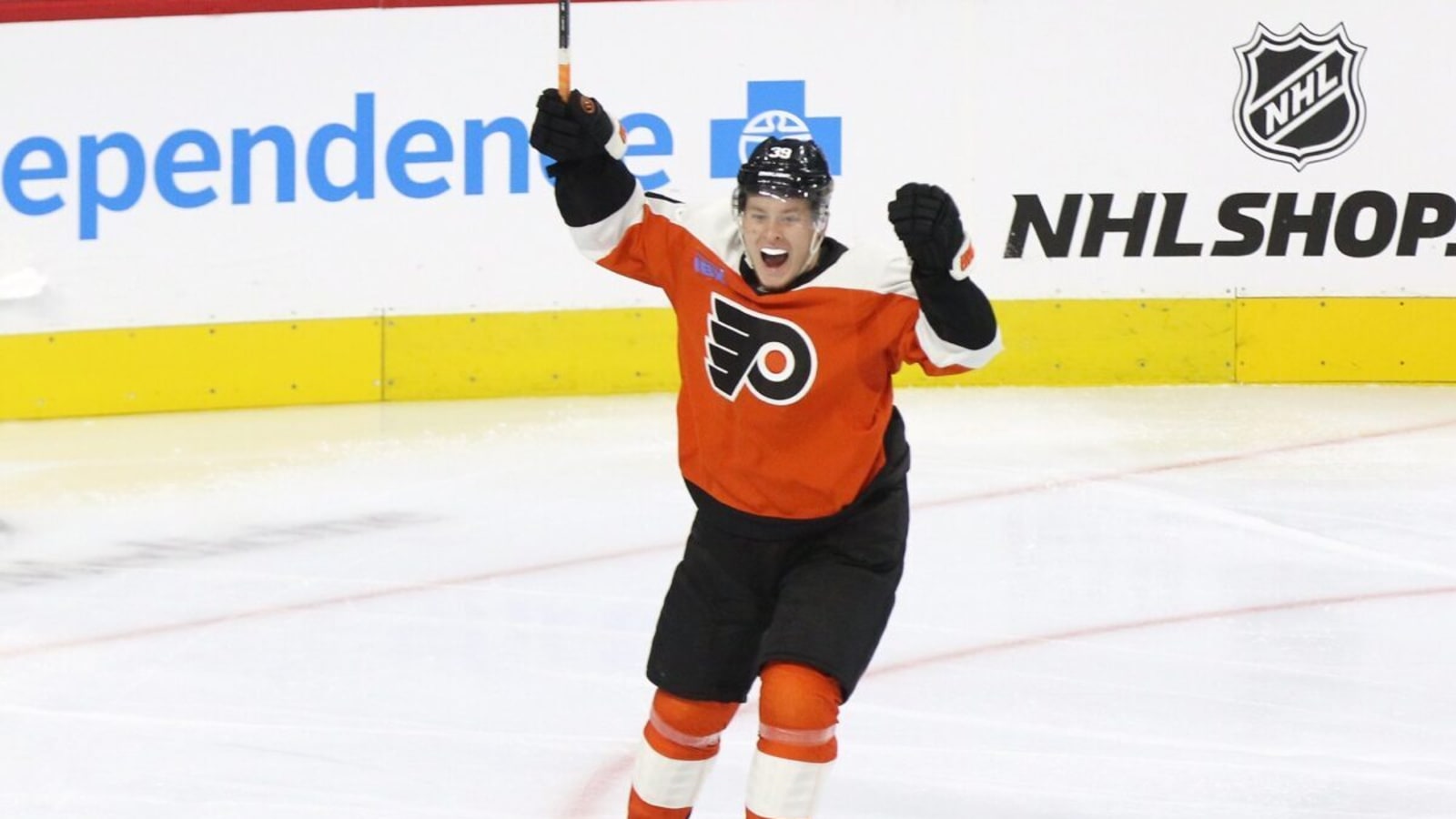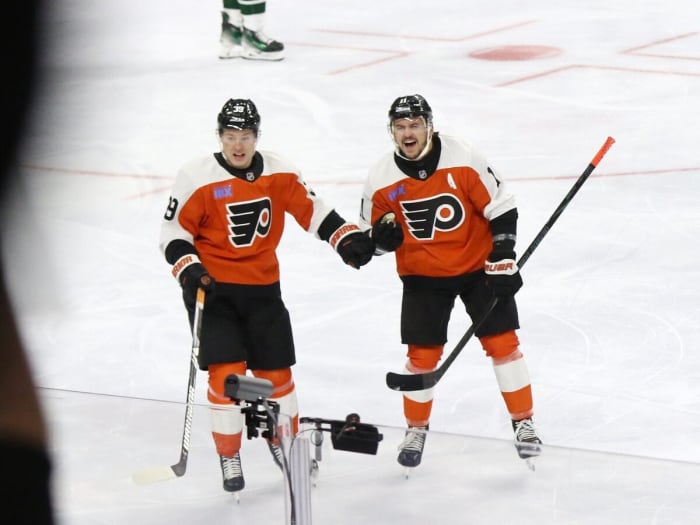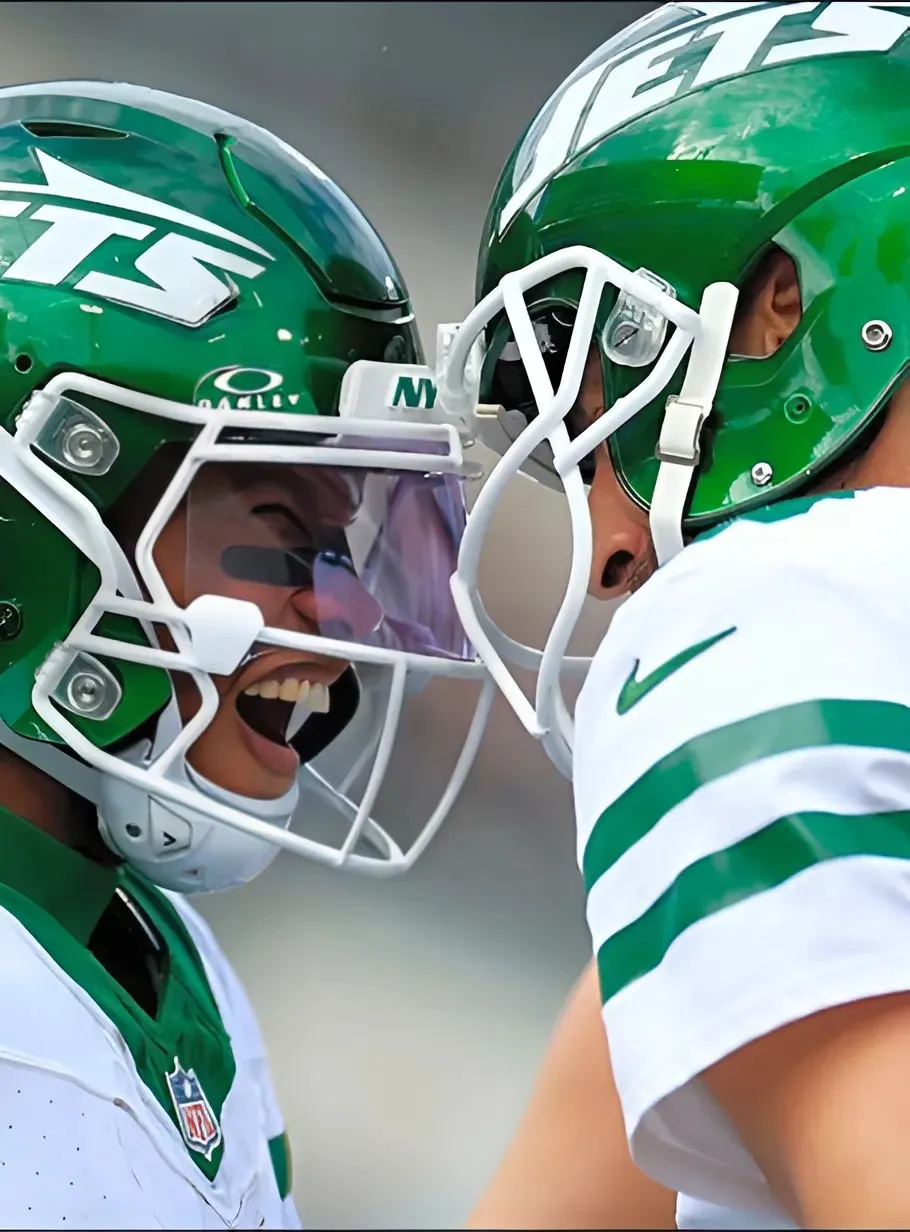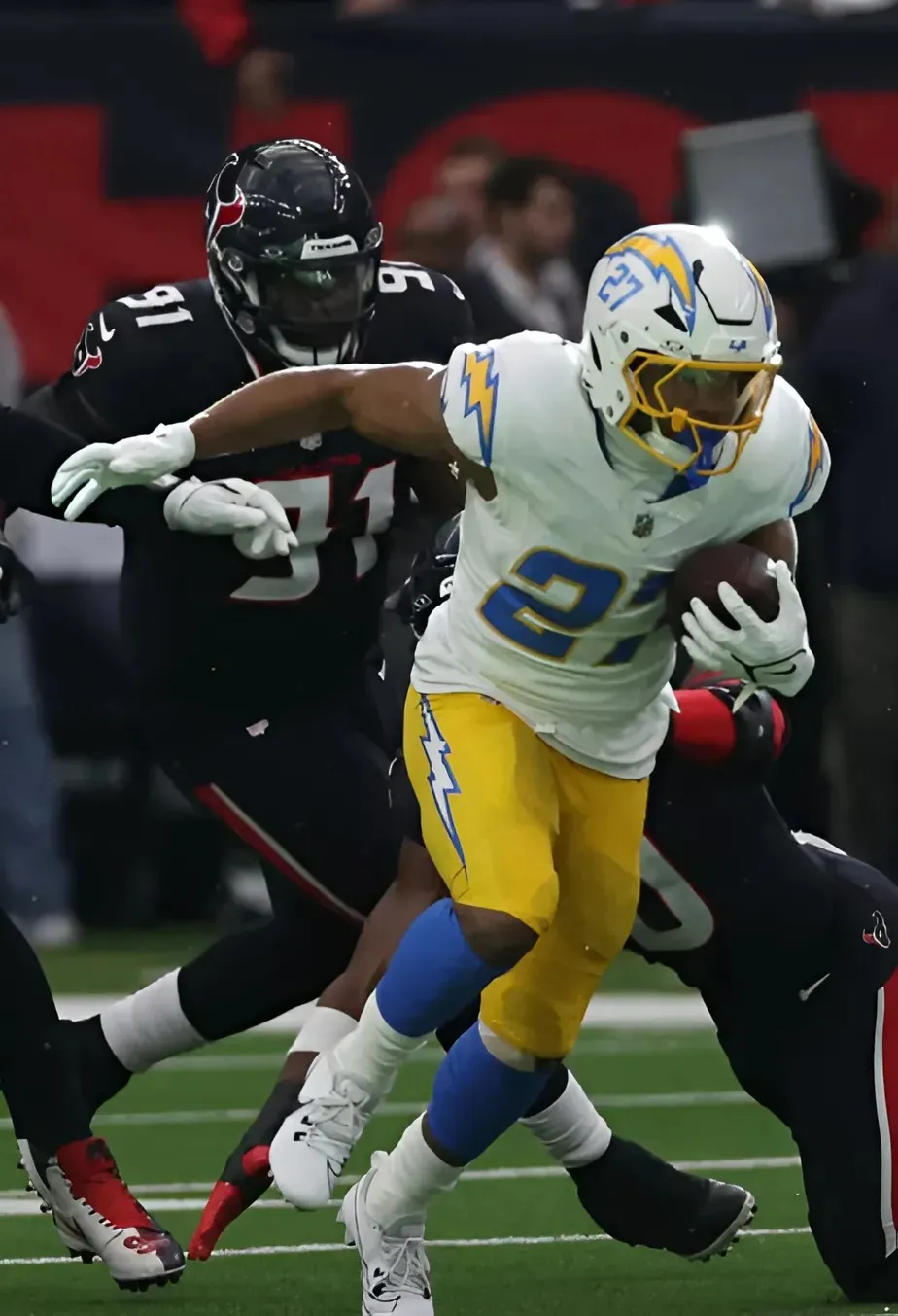
Most NHL teams have a player, coach, or executive who becomes the main character. That status can be obtained for good or bad reasons and by actions on the ice or off. Sometimes, it is revealed throughout the season; other times, the main character is evident before the first puck is dropped.
It was evident that Matvei Michkov would occupy this role for the 2024-25 Philadelphia Flyers when it was revealed he would be a part of them. Michkov became a part of the organization at the 2023 Draft in large part because teams were worried he would not come in three years when his contract in the Kontinental Hockey League expired. Sure enough, he didn’t come to North America after three years. He arrived after just one dominant season in the sport’s second-best league, especially for a 19-year-old.
The Flyers didn’t sign any marquee free agents on the July 1 opening day of business, but inking Michkov to his entry-level deal was more than sufficient. No player in the organization has a better chance of leading the Flyers back to glory than Michkov. That didn’t happen as a team in his rookie season, but that was never the expectation. All Michkov needed to do was show Flyers fans he had that ability. Based on that standard, Michkov’s first NHL season was a rousing success.
Dynamic Talent
Let’s start with the obvious: Michkov brings a level of skill that the Flyers haven’t seen since Claude Giroux’s peak. The raw puck skills were evident throughout the season as Michkov routinely attempted high-level maneuvers, including multiple occasions where he tried to score the iconic “Michigan” goal. He didn’t quite get it to go this season, but he had at least one close call, and it’s hard to believe he won’t hit it eventually.
Having skills is great, but knowing what to do with them is what matters. Michkov’s hockey IQ has long been regarded as one of his biggest assets. “You watch him work with his feet and his stick, he’s always thinking ahead of everybody. He takes a hit but his feet are making a play with the puck at the same time,” said general manager Daniel Briere ahead of Michkov’s NHL debut.
His skill as a sniper and playmaker was evident throughout his inaugural campaign. According to All Three Zones, Michkov led the Flyers in scoring chances and shot contributions, and was second in shots and shot assists per 60 minutes at 5-on-5. Michkov’s playmaking was one of the more positive developments, as he had always been regarded first and foremost as a sniper. He still showed that ability off, finding pockets of space in the high slot or from sharp angles to put up several “goal scorer’s goals.”
That included an overtime winner on Nov. 14 against the Ottawa Senators, one of three overtime goals Michkov scored in November, plus a shootout winner the previous game. After the second one, Michkov described himself as “cold-blooded” in clutch situations like those. When at his best, Michkov was capable of carrying the Flyers. He had nine points in his first eight games and had a couple of big runs down the stretch, scoring 10 points in his first six games after the 4 Nations Face-Off and finishing with 16 points in his last 10 contests. While that may have frustrated some Flyers fans hoping to improve their draft odds (in hindsight, a lottery win was never in the cards), it’s a positive reflection of Michkov’s competitiveness that he didn’t let up even when the playoffs faded out of reach.
Flyers fans may be disappointed that Michkov didn’t crack the top three in Calder Trophy voting. The previous two rookie leading goal scorers (Connor Bedard and Matty Beniers) won the award, and it’s the first time a rookie goals leader under the age of 24 wasn’t a finalist (Tanner Jeannot led rookies in 2021-22, but at 24 years old was older than the typical rookie). Blame a positional oddity for that — this is the first time a defenseman and goaltender have been nominated for the Calder in the same year since 2009-10, when Tyler Myers beat Jimmy Howard for the award. Before then, you must go back to 1984-85 to find a vote like that, when Chris Chelios and Steve Penney (both of the Montreal Canadiens) lost to Mario Lemieux. I heard he turned out okay.
Room for Growth
What separates talented players from true superstars is their work ethic and desire to get better. That certainly doesn’t sound like it will be a problem for Michkov.
“I’ve been around a few superstars and he’s got that mindset,” said Briere at his season-ending availability. “He came in and he has a detailed plan of all the things he wants to do. I was actually shocked with how prepared he was for his meeting. He knew exactly what he needed to do and how he wants to conduct himself.”
Few were probably as critical of Michkov’s play as his former head coach, John Tortorella. That isn’t to say that Tortorella didn’t appreciate Michkov’s talent or think he wasn’t any good. Tortorella has always been a tough-love coach. He largely took that approach with Michkov. Those aforementioned post-regulation heroics came after a two-game stint in the press box. To be fair to Tortorella, Michkov wasn’t driving play to a strong degree early on. The Flyers outscored the opposition just once in Michkov’s first 13 games before the benching, and he had an expected goal share better than the average Flyer in just five of those games, clearing 55% only once.
That trend continued for the next few weeks after Michkov returned to the lineup. His play-driving was firmly picked at the start of December. From Dec. 7 to the end of the season, he had a 53.85% xGF, which was 1.26% better than his teammates. Before that, he was at 47.23%, which was 1.42% worse than the rest of the team. That progress wasn’t perfect. Cherry-picking could still be an issue for Michkov as he tried to find the right balance between creating rush offense and getting caught defensively.
The Flyers were outscored 51-57 with Michkov on the ice at 5-on-5, and while a brutal 88.46% on-ice save percentage is a culprit, Michkov shouldn’t be absolved here. According to The Athletic’s Dom Luszczyszyn’s model, Michkov was in the 11th percentile defensively, the worst of any Philadelphia forward (from “NHL Player Cards: Metropolitan Division,” The Athletic, March 9, 2025). Of course, his 86th-percentile offensive rating was the best on the Flyers, and his $6.1 million value is second only to Travis Konecny. The trade-offs Michkov made were worth it more often than not. However, true stars either find a way to limit the negatives or ascend the positives into such a stratosphere that their mistakes don’t matter.
Michkov probably has the skill to make the latter work, but he still needs to get there. Surprisingly, he struggled mightily entering the offensive zone, ranking ninth out of nine Flyers who played the full season with the team in Corey Sznajder’s tracking data on All Three Zones in zone entries per 60. That’s despite having a carry-in rate higher than any Flyer except Owen Tippett, showing Michkov’s desire to make plays happen even if he couldn’t always execute. His work at his blue line also could be better, as he was below league average in recovering dump-ins and exiting the zone with possession.
Offensively, the main area Michkov can improve on is the power play, a sentence that applies to every Flyers player. He was just a hair behind Travis Konecny for the Philadelphia lead in PP xG per 60, but both players ranked outside the top 200 league-wide with a little over 7.2 points per 60. Michkov got off to a hot start on the unit, with his first four NHL points on the power play. Previous PP coach Rocky Thompson couldn’t figure out how to get Michkov (or anyone) in a consistent groove as the Flyers only barely crept out of the basement. A new coach bump is usually discussed as a head coach lifting an entire team, but a new face running the man advantage should be a boon for Michkov. It’s hard to see last season being anything but the floor.
What to Expect in Year 2
The road to stardom is rarely a linear one. Some of the brightest stars in the game today, like Jack Hughes and Nathan MacKinnon, took three or four seasons to clear 65 points, with MacKinnon exploding for 97 in his fifth season and Hughes for 99 in his fourth. Both players were No. 1 picks who debuted in their draft-plus-one seasons.
While Michkov may have been more physically advanced for his rookie season since he was a year older (particularly compared to Hughes), he’s also getting used to handling NHL hockey. His 80 games played were the most of his career (his previous high was 70 in 2020-21; in the last three seasons, he played 54, 55, and 48 games, respectively). The fatigue narrative was perhaps a bit exaggerated, as there were other reasons to explain his midseason scoring slump. But it also can’t be denied that he played his best hockey of the season after having two weeks off during the 4 Nations Face-Off.
There will be some different circumstances for Michkov in his second NHL season. First, he should expect to play a larger role. He played 16:19 per game under Tortorella, still the second most of any rookie skater (Macklin Celebrini had a sizable gap at 19:47, although he’s a center). That skyrocketed to 19:36 after Brad Shaw took over on March 27, putting him in line with Celebrini. Shaw could get the full-time job this offseason, but even if he doesn’t, Michkov should push for more ice time with a season under his belt.
The other thing is harder to quantify, and that’s Michkov’s emerging role as a face of the organization and the team. The Flyers were very cautious about setting expectations too high or making Michkov the star of their marketing efforts. The Athletic’s Kevin Kurz reported that the team will have a new slogan next season, and whatever the latest marketing package is, it will likely rely more on Michkov now that Flyers fans have seen him up close (from “Flyers governor Dan Hilferty on Tortorella’s firing, search for a coach, salary cap spending and more,” The Athletic, April 4, 2025).

Off the ice, teammates always talked about Michkov very positively, whether it be his competitive energy toward winning or getting more comfortable with the English language. The midseason trades Brière made, particularly moving Scott Laughton, open up avenues for new players to take bigger roles in the room. Michkov doesn’t need to anoint himself as the future captain right away or anything massive. But given his fierce intensity, it only feels like a matter of time before he steps up in the room.
For Michkov to jump into the NHL as a teenager (he turned 20 years old on Dec. 9) and not just not look out of place but be one of the Flyers’ top scorers is all anyone could have hoped for. When Michkov was first introduced, Brière emphasized that he shouldn’t be viewed as the team’s immediate savior. This season, he was right. But Michkov laid the groundwork to make Flyers fans believe that one day he can be the leading force driving the Flyers to greatness.



